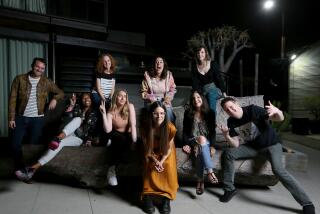ENTERPRISE : LEARNING CURVE: ANECDOTAL EVIDENCE : Tale of 2 Partners : Storytellers Teach Skills to Lawyers
- Share via
Ruth Halpern and Joel ben Izzy had 20 years of professional storytelling experience between them when they hit upon the idea of teaching their skills to lawyers. Since founding Anecdotal Evidence in Berkeley, they have learned that running an unconventional business can be both frustrating and rewarding. Halpern and ben Izzy were interviewed by Karen Kaplan.
The job of a trial lawyer is to tell stories, so this is a natural combination for a business. We help lawyers analyze their cases to find better ways to frame the stories of their clients. We also help them with techniques to tell their stories better. After all, what do lawyers do except stand up in front of a jury and tell them the story of their client?
We gave this business a good deal of thought before we decided to really make it happen. There’s a certain degree of unconventionality in being a storyteller in the first place, but it still took a measure of boldness to go forward and say, “We can make this work.”
We started the business in June and just started recruiting clients in September. Right now we are focusing on firms that do litigation. We approach the people who schedule the workshops that lawyers need to keep up their bar membership because this counts as continuing legal education.
There’s a certain amount of packaging we have to do to get our foot in the door of a law firm. Joel puts on a tie--even though as a pure storyteller he would never wear a tie--to show that we can speak their language. We put out formal announcements of our new partnership and printed up brochures and letterheads to show that we meant business.
Once we get inside, we can be as funny and clever and creative as we want. But to get in, the first question they are going to ask is, “Are you going to show up or are you going to flake?” Our initial impression has to be to look very serious and reliable.
When you take an art and turn it into a business, you open yourself up to some criticism. We’re vulnerable from both sides. The artistic voice in us is telling us that we’re selling out, while on the business side there’s a worry that we’re flaky. We have to have a strong sense of our own inner morals to stay focused.
We frequently hear people say that no matter what business you’re in, you’re in sales. It’s also true that you’re always an educator. For any small business owner, part of what you do is teach clients the value of your services so that they know they’ll be more effective if they hire you.
Don’t dismiss an idea just because it’s silly. It’s important to be bold. It’s really important to say, “If I have a vision, I can make it happen.” You have to focus on the “I want it” part, as opposed to coming up with a list of all the reasons why you can’t have it.
We’re very excited about what we do, and we feel good about it. In business, that counts for quite a lot.
On the two faces of their business . . .
“Once we get inside, we can be as funny and clever and creative as we want. But . . . our initial impression has to be to look very serious and reliable.”
On how they make storytelling look
serious . . .
“There’s a certain amount of packaging we have to do. . . . We put out formal announcements of our new partnership and printed up brochures and letterheads to show that we meant business.”
On the payoff of starting an unconventional company . . .
“We’re very excited about what we do, and we feel good about it. In business, that counts for quite a lot.”
AT A GLANCE
Company: Anecdotal Evidence
Owners: Ruth Halpern and Joel ben Izzy
Nature of business: Storytelling consulting service for lawyers
Location: Berkeley
Number of employees: 2
Annual sales: Expecting $40,000 in first year
More to Read
Inside the business of entertainment
The Wide Shot brings you news, analysis and insights on everything from streaming wars to production — and what it all means for the future.
You may occasionally receive promotional content from the Los Angeles Times.











